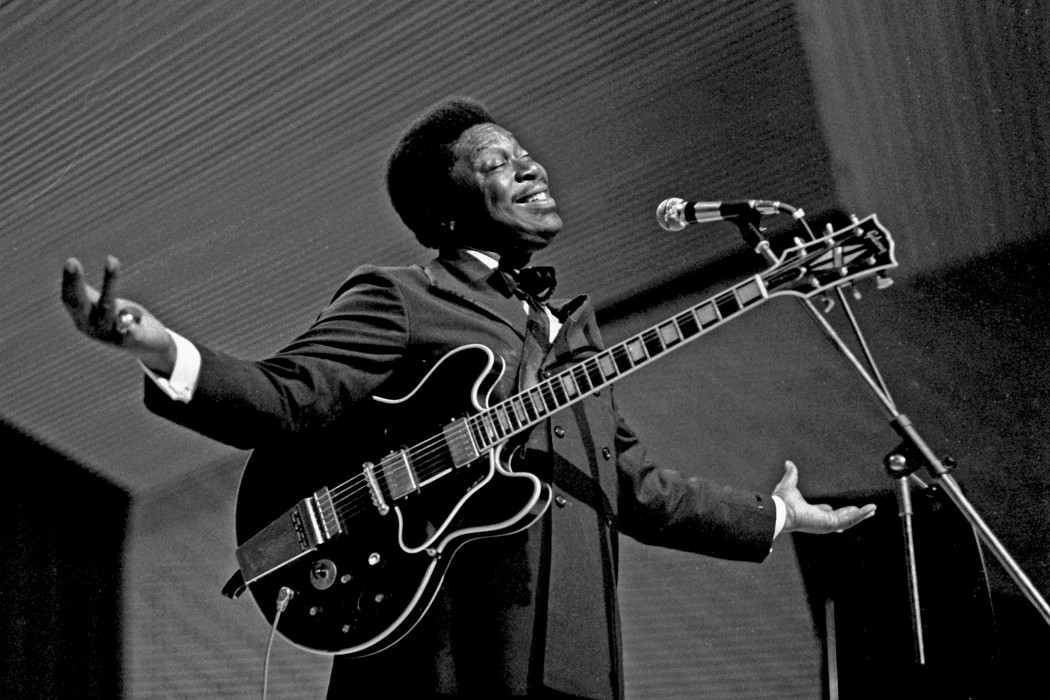On a sunshine Friday morning while sitting on my front stoop in Brooklyn, a car pulls up to the curb and begins blaring the sweetly aching notes of a B.B. King song from its speakers. People from the neighborhood begin to gather around the car, slowly swaying as the notes of the legendary blues man begin to wash over them conjuring memories of days when his music was the only kind that could speak to their souls. They are mourning one of the greats: a sharecropper’s son from Mississippi who loved what the blues could expose within the universe. We have all reveled in the intimate conversations he shared with us; ones that involved only him and his beloved “Lucille.”
Riley “Blues Boy” King died on Thursday at the age of 89 in his home in Las Vegas, NV. His music crossed racial lines and influenced both his contemporaries and future generations. Lenny Kravitz sent out a statement upon hearing of his passing that defines the King’s impact in one simple phrase: “BB, anyone could play a thousand notes and never say what you said in one.” It is not a coincidence that the day after his death, B.B. King’s music is the #1 searched for artist in iTunes. The world is afraid that they may have missed one sweet note, one more wail, one more squeal from Lucille and now that there will be nothing new, it is time to comb through the old for one more moment in time when the truth was being spoken by a blues man.
The recipient of 15 Grammy Awards and ranked 6 out of 100 Greatest Guitarists of all time by Rolling Stone, he graced the juke joints, the music halls and the mega-stages all over the world for over 6 decades. Inducted into the Rock and Roll Hall of Fame in 1987, “The King of the Blues” was a special kind of performer who could spread his love of music on and off the stage. He was a supporter of “Little Kids Rock,” an organization that provides musical instruments to underprivileged children, a recipient of the Presidential Medal of Freedom and the Kennedy Center Honors in 1995. But for those who experienced his music on another plane, like most of us, awards and honors are just a happy result, not the real message. The fans can recall the first moment they discovered him, the first moment he made the blues tangible, made it more than just a song on a record player. A song like, “How Blue Can You Get?” is such an elegant representation of the heart-aching torment that a man can suffer at the hands of the right woman that it is almost as if no one could ever properly articulate that message before B.B. King wrote it. He felt every note he sang, his body twisting with the phrases and he played in such a true way that his lyrics became intertwined with our perception of reality: a man can love a woman so much it hurts.
The first time I ever saw my mother dance in public was at a B.B. King concert in Hong Kong back in the 1990’s. I had no idea that my mother even had hips until I saw her shake and groove them in time with B.B. King’s wailing guitar notes and silky tones. I was both mortified and mystified. That is what The King of the Blues could do to people. He could get an expat housewife living in Asia to jump up out of her chair in a frenzy with one simple phrase, “Ladies and Gentleman, I’d like you to meet the blues.”
Rest in peace, Mr. King. The thrill will never be gone.
Article: Hannah Soule




